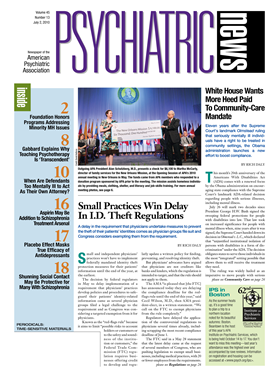Modern randomized, controlled studies of antidepressants demonstrate increasing effects of placebo because of patient selection and study design—a fact that has obscured the real value of antidepressants in the treatment of millions of people.
So said Michael Thase, M.D., at APA's 2010 annual meeting in New Orleans in May. Thase, a professor of psychiatry at the University of Pennsylvania School of Medicine, spoke at the session “Unmet Needs in Antidepressant Therapy.”
Thase addressed a theme picked up by the popular media recently that antidepressants don't work, or don't work any better than placebo—as exemplified in the January 29 article in Newsweek, “The Depressing News About Antidepressants.”
That conclusion is based on some recent research, including a meta-analysis in the January 6 Journal of the American Medical Association (JAMA) showing that the magnitude of benefit of antidepressant medication compared with placebo increases with severity of depression and may be “minimal or nonexistent, on average, in patients with mild or moderate symptoms.” The study was titled “Antidepressant Drug Effects and Depression Severity: A Patient-Level Meta-Analysis” (Psychiatric News, February 5).
But Thase said the conclusion drawn in the popular media—that the effects of antidepressants generally are “trivial”—is a distortion of the meaning of a placebo effect. And he noted that the JAMA study also found that for patients with more severe depression, the benefit of medications over placebo is substantial—a fact that he said comes as no surprise to psychiatrists.
“The decision not to treat someone in clinical practice is not the same as receiving eight weekly visits in a placebo-controlled trial under double-blind conditions,” Thase said. “Physicians cannot use placebo in their clinical practice—it's unethical. Their options are watchful waiting, which is not equivalent to a placebo effect; prescribing something; or seeing the patient for psychotherapy.”
He noted that even psychotherapy has an analogue to the placebo effect, and studies of psychotherapy efficacy often cannot reliably separate out treatment effects from nonspecific effects.
Moreover, the value of antidepressants in treating the most severely ill patients gets lost in studies that include large numbers of mildly depressed individuals who are more likely to respond to placebo, he said.
“The effects are not trivial in a condition that affects 14 million people at any given time,” he said. “A 10 percent advantage, if applied to the whole population, would mean that 1.4 million people were being helped. A large effect for 10 percent of people looks like a small effect when it's spread out across the remaining 90 percent of placebo responders and nonresponders.”
Thase showed data demonstrating that placebo effects have grown in studies over the years, owing largely to the nature of people who enter randomized, controlled trials and changes in study design. He noted that participants in contemporary studies are liable to be either the easiest to treat or the hardest to treat—those who respond to anything, including placebo, or to little or nothing. “That leaves a very small zone in which to show an effect,” he said.
“We may never find newer antidepressants if we don't fix this problem of the metastasizing placebo effect rate in modern studies,” he said.
